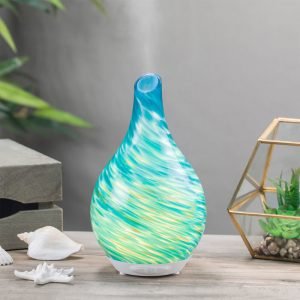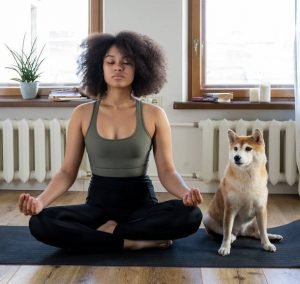By Mark Piatt
Updated on August 22, 2020
Using essential oils for odor elimination is a natural way of masking and eliminating those harsh odors using nothing more than essential oils and maybe some water.
Odor elimination is a multi-billion dollar business. Most products mask odors while others eliminate the odor. Most sprays you buy use harsh chemicals and use petroleum-based aerosols.
These products may advertise a certain smell or may say they use essential oils, but when you look at the fine print, the natural essential oil makes up about 1% – 5% of the total volume. 60% is the aerosol, usually butane or something similar. The rest are harsh chemicals created in the laboratory.
High-quality essential oils on the other hand are all-natural. When used in an ultrasonic diffuser, a few drops are mixed with nothing more than water – no more breathing in butane.
Before we get started, I would like to mention that if you would like to remove odors naturally, a few of the best products are baking soda, vinegar, and activated charcoal. But that is for another article. So, if you are ready to use 100% all-natural essential oils for removing or masking odors, read on.
DISCLAIMER:
Information provided in this description is for educational purposes only. For possible treatments of physical or mental diseases, please seek a trained and licensed health professional. Enchanted Aromatics is not responsible for any adverse side effects resulting from the use of any suggestions, products, preparations, or procedures mentioned or from following historical uses of essential oils.
What are essential oils?
Essential oils are naturally occurring compounds that are incredibly fragrant. They are extracted from plants, trees, leaves, needles, roots, bark, flowers, sap, – really any part of the plant. These essential oils serve many purposes including:
- Attracting pollinators
- Defense against insects and other animals
- Defense against bacteria, viruses, and fungi
- Allelopathy – beneficial or harmful effects of one plant on another plant.
- Protection against water loss
Various means are used to extract these oils which capture the plant’s scent along with the naturally occurring properties of that specific essential oil.
The most popular means of extraction is through steam distillation, but some essential oils require other means including cold pressing for some citrus oils, solvent extraction, enfleurage, and maceration.
Essential oils are not made of one specific compound. It is made up of a few to hundreds of individual compounds.
Many of these compounds have unique aromatic qualities. This is what gives the essential oil (and the plant it originated from) its characteristic aroma.
A word about safety
Just because an essential oil is natural does not mean it is safe. For all essential oils, you should adhere to the following basic safety advice:
- Do not take internally unless directed by a medical professional
- Do not apply to eyes, sensitive areas, or mucous membranes
- Avoid applying undiluted to the skin
- Pregnant women, nursing mothers, and children should not use essential oils without first consulting a medical professional
- Keep essential oils from, and out of reach of children
- If you are experiencing adverse side effects, stop using immediately
- Use caution when using essential oils around your pets
Many essential oils also have specific safety advice that you should adhere to. For example, peppermint essential oil smells just like peppermint candy. But using peppermint essential oil around babies can be dangerous because of the concentrated menthol.
When diffusing around infants, menthol can cause difficulty breathing, inflammation, and death. Ingestion is also highly toxic for an infant.
So be sure and do your homework first when using any essential oil around the youngsters.
Usually, essential oils derived from citrus or floral sources can be more easily tolerated by youngsters or those with compromised systems. But again, do your homework and start by only using small quantities.
Also do not forget about your pets, especially cats. Most essential oils are unsafe to use around cats because they have a deficiency of an enzyme called glucuronyl transferase. The lack of this enzyme gives cats a reduced ability to metabolize many toxins.
Cats are especially sensitive to essential oils that have phenols and phenolic compounds. Unfortunately, many essential oils have these compounds.
Choosing the right essential oil
Essential oils have become a multibillion-dollar industry. Unfortunately, the essential oil market has been flooded by scammers selling fake essential oils to make a quick buck.
If you have priced essential oils, you have probably seen how the price can vary greatly for specific essential oils. Let us look at an extreme example – Rose essential oil.
If you look at some of the big eCommerce marketplaces, you will see Rose essential oil selling for around $9.99 for 15 ml. But if you go to some of the well-known and respected essential oil companies selling 100% pure Rose essential oil, you will see their Rose essential oils selling for hundreds of dollars.
If you go to your favorite store and buy a pack of 6 essential oils for $9.99 – $19.99, I promise, you are getting a fake essential oil or a highly adulterated oil, despite what the packaging states.
So what gives? Those inexpensive Rose essential oils and all the other inexpensive essential oils are fakes. It requires a large amount of plant material to distill essential oil.
For Rose essential oil, it takes approximately 240,000 petals to distill 15 ml (1/2 oz) of rose oil. Wow! Think about that for a second. Think about how expensive purchasing a dozen roses can be.
You know how expensive roses are.
How are essential oils fake? Here are a few tricks these companies use:
- They mix their oil with a carrier oil such as jojoba or almond oil. You get just enough of the essential oil, so it smells like the real thing, but about 98% of the oil is a carrier oil.
- They use synthetics that smell similar but do not have the same qualities that are found in natural essential oils.
- They mix less expensive essential oils with their target oil that smell similar but are far less expensive to produce. Again, they will not have the same qualities as the oil they are portraying.
- They extract the essential oil quicker than they should so they can make more batches at a higher rate of speed. You are left with an inferior product.
So, if you are purchasing essential oils to fight odors, especially around pets, please do not skimp and buy inexpensive essential oils. You do not want to get your pet sick.
How do you fight odors with essential oils?
- The best way to make your space smell good again is to use your essential oils in an ultrasonic diffuser. With this method, you mix a few drops of your favorite essential oil with water. The diffuser then turns this into an exceptionally fine mist that spreads throughout your space. The amount of essential oil you use depends on the amount of water the diffuser holds and how powerful you want the fragrance.
- A nebulizing diffuser sprays the undiluted essential oil directly into the room. The aroma using this method is very concentrated since it is pure essential oil. This can be overwhelming for many people. Plus, since it is a pure essential oil, this method can get very expensive since most essential oils are on the expensive side.
- A spray bottle can be used to mix the essential oils with water, then spray the area whenever you feel the need. When mixing the oil for your spray bottle, use 20-25 drops of essential oil for every 2 cups of water. Since oil floats on water, give your bottle a good shake before spraying.
- You can also apply the essential directly. For example, an excellent way to get rid of “those” smells emanating from your restroom is to pour 2-4 drops of eucalyptus essential oil into your toilet before you “go”. This will magically mask many of “those” awful smells. Of course, if you just finished eating a red chili burrito, well then good luck. Not even this method will help.
- By using a passive diffuser, you usually add a few drops of essential oil to an absorbent pad or a cotton ball. The aroma will slowly emanate from the passive diffuser and fill your area with a subtle aroma. This method will provide the weakest aroma.
Best essential oils for odor control
The following essential oils are excellent at getting rid of all types of odors including pet odors, stinky kid odors, cooking (think fish) odors, restroom odors musty odors – really, any type of nasty odor you can think of.
- Bergamot
- Eucalyptus
- Grapefruit
- Lemon
- Lemongrass
- Orange
- Rosemary
- Lavender
- Mandarin
- Sage
- Tangerine
- Tea Tree
These twelve (12) essential oils on this list work especially well at freshening up your home. By far, the top choice will be citrus-based essential oils.
But these 12 essential oils are by far, not the only essential oils that can freshen up your home.
Essential oils made from trees also are excellent at removing odors. Some of the more well-known options include:
- Cedar
- Cypress
- Fir Needle
- Juniper
- Pine
- Sandalwood
- Spruce
Plus, you can mix many of these essential oils for a unique blend. At the end of this article check out some of the various blends you can use in your diffuser or spray bottle.
Keep in mind that what essential oil you use all comes down to personal preference. But some essential oils do work better than others for removing awful odors. Also, some essential oils work better at removing specific types of odors.
Also, keep in mind that all people may not like the same aroma’s that you like. For example, you may think Lavender essential oil is the best thing since apple pie, but everyone else in your house may absolutely despise the aroma of Lavender. So, take this list with a grain of salt and experiment to find what works best for you.
Best essential oils for pet odors
Many essential oils can be incredibly dangerous for our little friends.
Before using essential oils around your pets, it is a good idea to do your research first or talk to your veterinarian, and if you can find one, a holistic-based veterinarian.
Essential oils can sometimes interact with other supplements and medications, so make sure your veterinarian is aware of everything your pet is taking.
Remember, both cats and dogs have a sense of smell much more powerful than ours.
Using a spray bottle works really well for pet odors. Of course, a diffuser running on low works well also. When removing pet odors from your room, do not use essential oils in the area when your pet is in proximity. After spraying, let the area clear out first for at least 30 minutes before allowing your pet back into the area.
When using a diffuser, only run the diffuser for 10 minutes, or use a diffuser that turns the diffuser off and on at regular intervals. Also, it is usually best to run the diffuser on low.
Do not allow your pets to lick or swallow any essential oil. That means making sure your diffuser is set up in a place where your pet can not knock it over and lap up the water.
The following essential oils are not simply good for getting rid of pet odors, but they are excellent for removing all types of odors (think stinky little boys).
Essential Oils That Are Safe For Your Dogs And Cats (Diffusing Only)
| Essential Oil | Dogs | Cats |
| Arborvitae | X | |
| Cedarwood (Eastern Red Cedar) | X | X |
| Chamomile | X | |
| Clary Sage | X | X |
| Cypress | X | |
| Eucalyptus Radiata | X | |
| Frankincense | X | X |
| Geranium | X | |
| Ginger | X | X |
| Helichrysum | X | X |
| Jasmine | X | |
| Juniper Berry | X | |
| Lavender | X | |
| Marjoram | X | X |
| Myrrh | X | X |
| Rosemary | X | |
| Spikenard | X | |
| Sweet Orange | X | |
| Thyme | X | |
| Valerian | X | X |
| Vetiver | X | X |
The above essential oils are only safe around your pets when diffusing or spraying, nothing else. Even then, observe your little friends very closely to make sure they are not having any adverse effects from the essential oil.
Essential Oils That Are Not Safe For Your Dogs And Cats
| Essential Oil | Dogs | Cats |
| Anise | X | |
| Basil | X | |
| Bergamot | X | |
| Cinnamon | X | X |
| Clove | X | X |
| Citrus | X | X |
| Eucalyptus | X | |
| Fennel | X | |
| Geranium | X | |
| Hyssop | X | X |
| Lemon | X | |
| Lemongrass | X | |
| Lime | X | |
| Orange | X | |
| Oregano | X | X |
| Peppermint | X | X |
| Rosemary | X | |
| Sandalwood | X | |
| Spearmint | X | X |
| Sweet Birch | X | |
| Tea Tree | X | X |
| Thyme | X | X |
| Wintergreen | X | X |
| Yarrow | X | |
| Ylang Ylang | X | X |
Keep in mind this is not a comprehensive list. Some of these oils can be diffused in small amounts around your pets and others should be completely avoided. Do your research.
A couple of notes. Tea Tree and Pine essential oil are especially hazardous to your little friends. Diffusing these oils around your pets can cause them to have liver failure.
Peppermint and citrus-based oils are safe to diffuse in small amounts around your pets but become highly toxic if ingested. So, keep that in mind when doing your research.
Like many plants that essential oils are derived from, lemongrass itself is not toxic to cats. But, as a concentrated essential oil, lemongrass becomes toxic to cats, if ingested. Looking around at expert opinions on the internet, the consensus appears to be that it is safe to diffuse lemongrass in moderation around our feline friends.
Best essential oils for restroom odors
Here we go, you knew this one was coming.
With essential oils, you can make your restroom go from smelling like this:
To smell like this.
For the restroom, you are looking for essential oils that can brighten and freshen up your little space. You may also want to think about choosing essential oils that have some anti-microbial and anti-fungal properties.
Instead of using a single essential oil, you may also want to think about mixing essential oils.
Here in our home, we have discovered that instead of using an ultrasonic diffuser in our restrooms, we use a fan-based diffuser. The reason is that when we go to do our “thing”, we just reach up and add a few drops to the pad, and then turn on the diffuser for a few minutes.
This is much more convenient than needing to take the time to fill the diffuser with water and let it run for hours. Then when done, have to clean out the diffuser bowl so mold does not grow in it.
With the fan-based diffuser, we just need to occasionally wash out the absorbent pad.
Here is our favorite essential oil restroom pick:
- Bergamot
- Cinnamon
- Eucalyptus
- Lemon
- Lavender
- Lemongrass
- Tea tree
- Orange
- Peppermint
- Thyme
Use alone or mix for a great refreshing combination.
Creating a spray to spray directly into the toilet before you go works magic. The best essential oil to use is Eucalyptus, but you can also make a variety of blends that really work nicely together. Try a mix of Lemon and Eucalyptus or Pine, Sweet Orange, and Tea Tree.
For your spray bottle, add 50 drops of essential oil for every 4 ounces. Since oil floats on water, shake before spraying. Spray 4-6 times in your toilet bowl before you go.
You can also use your spray bottle when you need a burst of freshness. This is a great option when having guests over.
You can also make a 100% natural all-purpose cleaner that smells absolutely freshening. Mix the following in a 16-ounce bottle.
- 1 cup of water
- 1 cup vinegar
- 1/2 tsp all-natural dish soap
- 15 drops of lemon oil
- 10 drops of eucalyptus oil
Best essential oils for stinky shoes and socks
 Yes, we have all been there. You take your shoes off after a long day at work or after your quick workout and whew! That unpleasant aroma whiffing from your shoes can make your eyes water.
Yes, we have all been there. You take your shoes off after a long day at work or after your quick workout and whew! That unpleasant aroma whiffing from your shoes can make your eyes water.
If you do not have time to wash your shoes (or feet), you can create a DIY all-natural shoe odor eliminator spray with just a few ingredients.
The following recipe is for a 3-ounce spray bottle: Adjust amounts for other sizes of bottles.
- 1 ounce distilled water
- 2 ounces witch hazel
- 15 drops of Bergamot, Sweet Orange, or Grapefruit
- 20 drops of Lemon or Lemon Grass
- 10 drops of Sage
You can increase the number of drops of essential oils you use if you would like a more powerful aroma. You may also want to try mixing Peppermint or Eucalyptus with this mix. Feel free to experiment.
Be sure and mix the bottle well since essential oils will float on water. Spray the insides of the shoes well enough so they are slightly damp. Allow the shoes to fully dry before using them.
This combination of essential oils will not only help remove the funk; the anti-microbial properties of these essential oils should help reduce the number of bacteria growing in the shoe.
Best essential oils for musty odors
 One of the most common nasty smells we find emanating somewhere around our home is a musty odor. Sometimes the source is easy to find – mold growing on shower walls, a wet carpet, dirty kid socks under the bed, etc.
One of the most common nasty smells we find emanating somewhere around our home is a musty odor. Sometimes the source is easy to find – mold growing on shower walls, a wet carpet, dirty kid socks under the bed, etc.
Other times the offensive odor alludes us – maybe there is mold growing in the walls, in the basement, etc.
Sometimes the odor can become so bad that it permeates into other rooms, clothes, etc.
The best option is to find the source of the offensive odor and eliminate it. You can also use products such as baking soda to remove the odor. Or you can buy a spray that overwhelms the area with a fresh fragrance for about 30 minutes, but then the musty odor returns.
If you want to fill the room with a beautiful fragrance that overcomes the musty odor, using a diffuser with essential oils in this situation is a much better choice. You get a nice subtle fragrance that gets continuously replenished (at least until your diffuser turns off).
The five best essential oils for removing the offensive musty odor are:
- Grapefruit
- Lemon
- Orange
- Sage
- Tea Tree
Using a passive diffuser could also work in this situation. With this type of diffuser, you place drops of oil on an absorbent pad or cotton ball. You could also place cotton balls in strategic areas around your home. Inside flower vases, in your closet, restroom, etc. Your imagination is the limit.
Odor removing Essential oil blends in a diffuser
 Using your diffuser, here are 12 blends you can try for removing odors. These amounts are for a diffuser in the 100 – 200 ml capacity. Refer to our Diffusing Guidelines in our FAQ for making adjustments or follow the guidelines in your instruction manuals for adjusting the amount you use for your particular size of diffuser.
Using your diffuser, here are 12 blends you can try for removing odors. These amounts are for a diffuser in the 100 – 200 ml capacity. Refer to our Diffusing Guidelines in our FAQ for making adjustments or follow the guidelines in your instruction manuals for adjusting the amount you use for your particular size of diffuser.
A spicy fruity fragrance
- 2 drops of Lemon
- 2 drops of Orange
- 3 drops of Ginger
Peacefulness
- 6 drops of Cedarwood
- 3 drops of Lavender
Sweet and Spicey
- 3 drops of Cinnamon
- 3 drops of Lemon
- 3 drops of Orange
Minty Aroma
- 3 drops of Eucalyptus
- 4 drops of Spearmint
- 2 drops of Peppermint
Citrus Delight
- 2 drops of Bergamot
- 3 drops of Grapefruit
- 3 drops of Lemon
- 2 drops of Lime
Stale Remover
- 2 drops of Lavender
- 3 drops of Peppermint
- 2 drops of Rosemary
Fresh And Clean
- 5 drops of Eucalyptus
- 4 drops of Peppermint
- 2 drops of Tea Tree
Refreshing
- 2 drops of Lavender
- 3 drops of Lemongrass
- 2 drops of Rosemary
Clean and refreshing
- 2 drops of Lemon
- 3 drops of Orange
- 2 drops of Tea Tree
Minty Lavender
- 5 drops of Lavender
- 3 drops of Spearmint
Revitalization
- 4 drops of Bergamot or Orange
- 2 drops of Juniper Berry
- 3 drops of Lavender
Flowery
- 3 drops of Orange
- 3 drops of Geranium
- 3 drops of Lavender
And finally, keep in mind that the best essential oil aroma will not overwhelm your room. Instead, you want the room to be a welcoming space. You want someone to come in and say “mmm, what smells good?” not “WOW, WHAT IS THAT SMELL”?, While they cough.
Have fun and enjoy making your space smell absolutely beautiful.





Hi there, I found your site via Google whilst looking for a related subject, your site came up, it seems to be good.
Hi to all, how is everything, I think every one is getting more from this site, and your views are pleasant designed for new users. Julissa Borlow